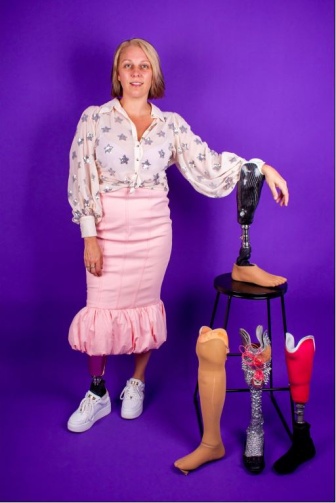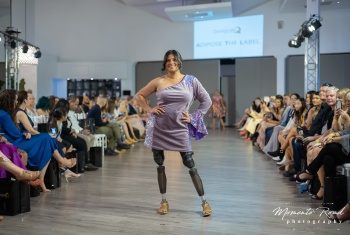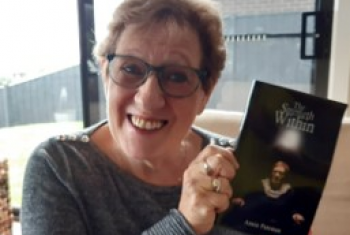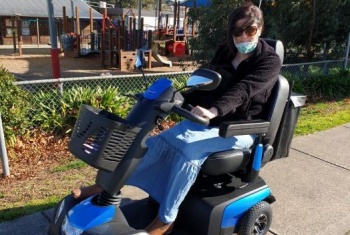Newcastle local Niki Williams lost the lower part of her right leg in a car accident 20 years ago.
After being cut out of the car and rushed to hospital she became an amputee within hours.
At 19, Niki’s near-death experience changed her outlook on life.
Since then, the 39-year-old has dedicated herself to disability advocacy and breaking down barriers and stereotypes.
Niki also mentors other amputees and families and offers her services to prosthetists when they attend state, national and worldwide conferences to demonstrate the latest in prosthetic limb technologies.
'Blinging out' one of her old prosthetic legs, Niki said she’s even grabbed the attention of singer/songwriter Lady Gaga who kissed her leg and signed it.
The interaction led to Niki featuring in two images on Lady Gaga’s 2013 Body Revolution album cover.
Now, keen to do even more to support people with disability, Niki has landed a job at the NDIA in its Co-Design and Engagement team.
A NDIS participant herself, Niki says she is hoping to share her lived experience of disability to help make the NDIS the best it can be.
“I’m so excited about my new role and what I can bring to it.
"I have so much to share.
"Being a participant I know how a plan works and what types of supports help.
"Understanding how a plan works from both sides is really beneficial,” she said.
In 2002, when Niki had her car accident, supports were limited.
“The NDIS didn’t even exist,” she said.
“I’d never needed support before.
"I’d never broken a bone, had a stitch or even a blood test.
"Then I woke up in intensive care, amputated below the knee.
"I spent 3 months in hospital.
"My life changed instantly.
“The surgeon told my mum I’d be okay, just like Paul McCartney’s (former) wife Heather Mills.
"They married that year and stories about her prosthetic leg were all over the media.”
On release from hospital, Niki said she did intensive rehab and had constant physio.
“I was referred to an artificial limb service.
"It supplied the basics but if you wanted anything extra, like a water leg, you had to pay for it.
"It was hard for a 19-year-old,” she said.
“I was lucky though.
"I had a good network of people around me – 2 fantastic prosthetists, one who specialised in orthotics, and I had a physio who really looked after me.”
There are significant positive changes for participants aged 15 and over since entering the Scheme in the areas of health and wellbeing, choice and control, relationships, home, social and community participation, and lifelong learning.
While Niki admits to up and down moments after her amputation, like hiding her leg and not wanting to go out, the support she received from her tight network soon had her up and out, embracing her new life and determined to raise greater disability awareness.
Then in 2015, Niki’s prosthetists talked to her about the NDIS – the supports it provides to all Australians, with individualised funding for people with life-long disability.
“My prosthetist encouraged me to apply and I’m thankful for the NDIS every day and the support I’ve received,” she said.
“Only having the basic prosthetic leg sucked.
"Now I have 3 good legs and a fantastic foot.
"It’s been lifechanging.
"It’s enabled me to achieve activities with ease almost the same as anyone with 2 legs.
“Legs are a bit like shoes.
"I have an everyday leg I wear with a silicone liner and a leg I wear when I go in the water.
“I’ve also got a basic leg.
"I wear it in the evening to relieve my stump.
"I hate that word.
"Mum and I call it “Pegi”,” Niki added with a laugh.
“I alternate with it.
"It’s good to wear in hot weather and it gives my knee a break from wearing silicon.”
Niki is one of several participants who have discovered the NDIS is giving them greater independence when it comes to make more decisions about their lives.
"For participants aged over 15, 69 per cent said the NDIS has given them more choice and control.
Niki said having leg options allows her to do most things like everyone else.
“I’ve also got a fantastic foot, which is so good I haven’t even asked for a cosmetic finish to put over it.
"I’ve been getting around with a pole which is not like me,” she said.
An increased number of young adult participants made more decisions in their life than they did 2 years ago. Participants felt they could choose their support services, and how to spend their free time.
“My prosthetics have also allowed me to live a really good, busy, non-stop life and to have legs that keep up with me!
“Most importantly they’ve helped to elevate my confidence, maintain my mental health, and increase my quality of living, so thank you NDIS!”



